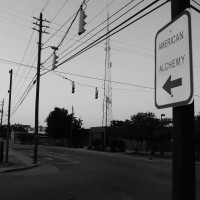What to expect from a band that includes half of an obscure D.C. hardcore band, as well as Garrett Klahn (Texas Is the Reason) and Brooklyn indie rock vet John Herguth (House & Parish), both of whom make up Brooklyn's Atlantic/Pacific, steel guitar legend Billy Cooper, and a blue-collar salsa trombonist?
Bluegrass-tinged indie pop, obviously, and while the genre of this record may be bizarre, it somehow manages to wear its members' influences on its collective sleeve. It sounds like a punk record wearing the clothes of many genres, and while they may not always fit, the result is surprisingly pleasant.
In the context of recently released punk-meets-country albums, this one fills a niche that's been left mostly empty. Where most have incorporated country as a softening influence, this record opts for the crowded bluegrass aesthetic–all the instruments all the time–and the result is something that's more often loud and declarative than subtle and intimate.
It could all be a little much, but whenever the record threatens to sound overcooked, vocalist Dreux Richard steps in to save it from itself with some truly thoughtful lyrics, which will come as no surprise to those that are familiar with his previous bands, where his inconsistent vocal performances contained flickers of lyrical brilliance.
"You can't go home; you can only leave home to know home. You can't go home, where the lights are off and your family's sleeping. You can't go home; you can only rest your thoughts against the memory. You can't go home, or wander your old heart's darkened chambers," he sings on album opener "Hoover Dam", while the steel guitar twinkles beneath him, and the lyric sets the tone for the unexpectedly successful balance the album strikes between pop and poetry.
One moment in particular witnesses everything coming together for the band. All the instruments stop competing and work together like in the best of bluegrass. It also offers the album's most winning lyric, halfway through title track, "The First Angel You Meet". "It won't be me," sings Richard. "I've quit too many homes. I've roughly handled too many hearts, most of all my own. I haven't cared for the seeds I've sewn, and there's only dirt where my dreams were meant to grow. I spent life chasing echoes, thinking they'd lead me to the light. I wasted the days on highways, coming and going, but I never arrived."
Herguth and Klahn are well at home providing the driving guitars that give the record its size, and drummer Brian Salant (Days, the Near Distance) follows right behind them, powering through songs that might have sounded very different (and made much less sense) if he'd exercised more restraint. For better or worse, Billy Cooper picks his moments carefully here, and his steel guitar seems to appear solely when there's space for it. It lends the songs structure and keeps the bluegrass tinges from growing repetitive. Trombonist Percy Recavarren, on the other hand, plays a surprisingly large part. His horn is in constant play, and it lends the record a legitimate pop sound that keeps it from turning into glorified pop-punk.
There are some missed opportunities. Not even Recavarren can save "Departures" from sounding like pop-punk with a couple extra instruments, something Cooper, who offered the track very little, seemed to have sensed. It's not a bad song, but it breaks the record's spell by veering too far toward the genre most of the band's members know best. Musically, the five-plus minute "A Career in Statistics" is the record's standout track, but its lyrics take a turn for cheesy breakup song territory near the end.
Maybe the band should be forgiven for those missteps, given it's unlikely any of them had a clue how this strange assemblage would end up sounding. Ninety percent of the time, it sounds phenomenal, and the frequently transcendent lyrics assure it'll be memorable for the few who listen to it–I say few because Richard was responsible for the record's release, and I've never known a person lazier about making sure people hear his music. I got my copy via an email that linked to his FTP server. Knowing the fate of his previous band's records, a spot on his FTP server is likely all this record will get. The good news, anyway, is that it's free, and worth listening to.
DOWNLOAD
The First Angel You Meet
